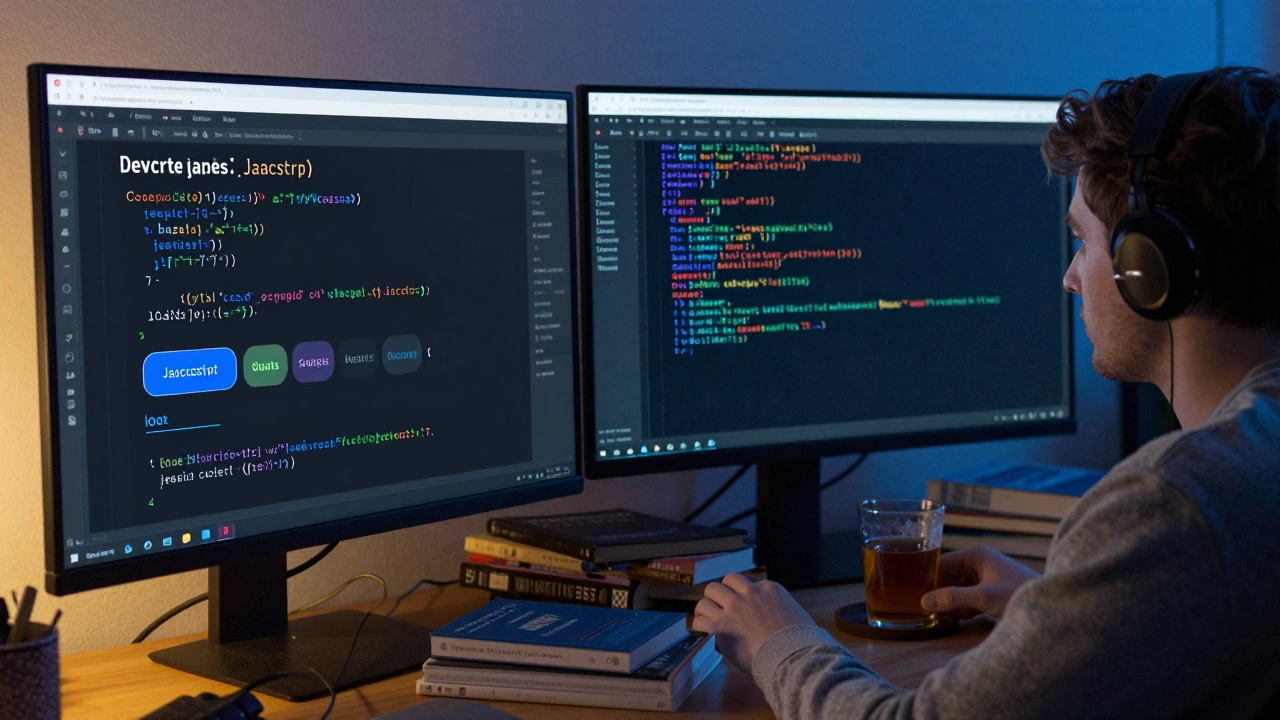If you think age is a deal-breaker for learning JavaScript, I’ve got news for you—you’re not the only one with that nagging thought. Loads of people, including some of my friends in their 40s and 50s, say things like, “I missed the boat” or “My brain just doesn’t work that way anymore.” Here’s the honest truth: how old you are matters way less than you imagine. Tech might love to parade 23-year-old coders, but there’s no actual rule keeping you out.
Here’s something wild: a 2023 Stack Overflow survey said nearly 18% of devs started coding after 30. Age didn’t stop them from landing jobs or building their own projects. You’re not racing some imaginary clock—what really counts is if you’re willing to get uncomfortable, make mistakes, and keep at it, even when JavaScript throws weird errors your way. It’s not about memorizing every function; it’s about learning how to look up what you need and nudging your brain to work a little differently. If you’ve ever watched a kid struggle with the same homework problem for an hour, you already know that learning new stuff is messy, no matter how old you are.
- Why Age Doesn’t Matter in Coding
- The Real Roadblocks—And How to Break Them
- How Adults Actually Learn (And Win) at JavaScript
- Practical Tips for Getting Started Now
- Building Confidence Through Action
Why Age Doesn’t Matter in Coding
People love asking if there’s a cut-off age for learning JavaScript or joining the tech world. The reality: age doesn’t block you from picking up tech skills over 40, or even 50. You don’t have to turn your brain into a calculator or be the kind of person who built websites since high school. In fact, some of the world’s most respected coders started after careers in totally unrelated fields.
Here’s something that usually surprises folks: research out of MIT (2020) found that our ability to learn new tech skills, including programming, barely drops off till you’re around 60. Programming isn’t about having the fastest reflexes or a superhuman memory; it’s about pattern recognition and problem solving—skills that often get sharper with experience, not fuzzier. Plus, tools and community support for adult coding have exploded in the last decade, making it friendlier than ever for newcomers.
| Age Group | % Who Started Coding |
|---|---|
| Under 20 | 22% |
| 20-29 | 44% |
| 30-39 | 18% |
| 40+ | 16% |
Those numbers tell the real story—lots of people are jumping into learn JavaScript and other languages long after college. If you’re learning as an adult, you probably know what motivates you better than any high school kid cramming for finals. You have work, family, or hobbies that can use a boost from coding, and that kind of clarity is a huge plus.
The biggest advantage, though? Life experience. You’ve already spent years figuring out creative ways to solve problems—maybe managing a family or running a business. These skills actually make it easier to spot patterns, keep projects on track, and build things people want. Young coders might be fast, but adults often bring a better sense of focus and purpose.
The Real Roadblocks—And How to Break Them
Lots of folks think being too old is the main problem with learning JavaScript, but that’s rarely true. The real stuff that slows people down? It’s not what you might expect. Let’s call it out: fear of looking dumb, comparing yourself to younger coders, juggling busy schedules, and doubting your memory. These things trip up pretty much everyone over 30 who jumps into code.
First, the fear of “not getting it” can crush your motivation. You’re not alone—imposter syndrome is super common, even in senior developers. The trick isn’t avoiding mistakes, but accepting you’ll make them from day one. JavaScript is designed to confuse beginners (hello, ‘undefined is not a function’ errors). Instead of feeling stuck, get used to Googling your errors. Stack Overflow and free resources like MDN Web Docs are lifesavers.
Time is another big roadblock. Kids might have all weekend to mess with code, but adults have jobs, families, or maybe a mischievous dog like Luna demanding a walk just as your code finally “almost works.” The fix? Don’t wait for long blocks of free time. Instead, try the ‘20-minute rule’—set aside just 20 minutes each day for learning JavaScript. You’ll stay consistent without burning out. Here’s an idea of how learners budget their time:
| Time per day | Progress after 1 month |
|---|---|
| 10 minutes | Basics: variables, functions |
| 20 minutes | Adds loops, arrays, debugging |
| 1 hour | Starts building small projects |
Another roadblock? Comparing yourself to young coders who seem to “get it” faster. The truth: adults are actually better at sticking with projects once they start, and have more patience. Rather than racing through, use solid resources with practical examples. FreeCodeCamp, Codecademy, and YouTube channels like ‘The Net Ninja’ break concepts down, making learning more doable.
And about memory—sure, you might not memorize every JavaScript method after reading it once. But you don’t have to! Even pro developers Google stuff daily. Focus on understanding what problems different tools solve, not memorizing every detail. If you keep practicing with real code, your memory will catch up.
Quick tips that actually help:
- Lean on documentation and search engines. Bookmark guides you like.
- Don’t skip writing code by hand—even if it feels clumsy, muscle memory matters.
- Break problems down, Google each step, and celebrate small wins. A working button or alert is progress.

How Adults Actually Learn (And Win) at JavaScript
Think you’re too set in your ways to pick up JavaScript? That’s not really how it works. Adults actually learn differently than kids—and you can use that to your advantage. For starters, adults are usually way better at connecting the dots between what they’re learning and their real-world needs. So if your goal is to launch a website or automate boring work stuff, you’re more likely to stick with it because it’s relevant to your life. That’s a huge win over someone learning “just because.”
A cool fact: adult learners are more self-motivated than young students, according to research from the American Psychological Association. If you’re reading this, you probably already have a concrete reason for wanting to learn JavaScript—that’s half the battle.
Adults have some killer strategies that work great for JavaScript tips:
- Focus on small goals: Trying to become a JavaScript ninja overnight isn’t realistic for anyone. Instead, build something tiny first, like a calculator or to-do list. Each win boosts your confidence.
- Use your daily experience: You already know how to learn new things—maybe you’ve fixed stuff around the house or picked up new skills at work. The same mindset works for coding. Break problems into chunks and look for patterns, just like you would anywhere else.
- Leverage resources made for adults: Tons of sites (like freeCodeCamp, MDN Web Docs) cut through the jargon. YouTube channels, podcasts, and even local coding meetups are packed with folks learning as a second or third career.
And here’s something interesting from a 2024 Codecademy report:
| Age Group | Course Completion Rate |
|---|---|
| 18-29 | 28% |
| 30-44 | 34% |
| 45+ | 38% |
See that? Adults over 45 finished courses more often than younger folks. Chances are, it’s because they’re learning with purpose, not just dabbling. If you put in a bit of effort regularly, use examples that actually mean something to you, and don’t stress about memorizing everything, you’ll get results.
So next time you ask, “Am I too old to learn JavaScript?” remember—your adult skills might just be your secret weapon.
Practical Tips for Getting Started Now
Ready to kick off your journey with JavaScript? Here’s how to sidestep the common pitfalls most adults run into and where you actually want to put your energy.
- Start Small, Stay Consistent: Even 20 minutes a few times a week adds up. It’s better than cramming for hours and burning out fast. The first few weeks might feel awkward, but that’s true for everyone, not just adults.
- Pick the Right Resources: Skip textbooks from the ‘90s—go for hands-on platforms like freeCodeCamp, Codecademy, or Scrimba. They let you type real code in the browser so you see instant results. If you prefer videos, YouTube channels like Traversy Media or The Net Ninja break things down in plain English.
- Make Stuff You Care About: Set a tiny goal, like making a to-do list app or a dog name generator (my dog Luna would love that). When you build something personal, you’re way more likely to stick with it.
- Google Is Your Best Friend: Don’t stress about remembering every command. The best coders look things up all the time—even in professional jobs. Instead, practice learning how to search for answers when you get stuck.
- Join Communities: Jump into free online forums like Stack Overflow or Reddit’s r/learnjavascript. You’ll find beginners of all ages, and it’s super reassuring to see others wrestle with the same hiccups you do.
If you like numbers, check this out: according to a 2024 learner survey from Codecademy, over 30% of new JavaScript users said having a "clear, small project" as a goal helped them stay motivated longer than any other reason.
| Action | Tool/Resource | Benefit |
|---|---|---|
| Interactive coding | freeCodeCamp, Scrimba | Practice as you learn |
| Q&A and support | Stack Overflow, Reddit | Get unstuck quickly |
| Project ideas | GitHub, CodePen | Real-world examples |
| Motivation | Peer groups, coding buddies | Accountability |
Lastly, stop telling yourself "I have to learn everything before I try." Jump in, break things, laugh at the ridiculous errors, and keep moving. Picking up JavaScript as an adult isn’t about being perfect—it’s about showing up, messing around, and slowly getting better. You got this.

Building Confidence Through Action
When you’re learning JavaScript as an adult, waiting to “feel ready” is basically a trap. Confidence comes after you start doing stuff, not before. A lot of new coders—even people in their 30s, 40s, and beyond—think everyone else just gets it faster. Truth is, nobody gets it right away. You get good at coding by coding, not by reading about it, or buying another course you never finish.
One thing that helps right away: make tiny projects. Don’t try to build a fancy website on day one. Instead, try something simple, like a calculator, a to-do list, or a random quote generator. These bite-sized pieces let you see progress fast, and finishing them feels awesome. People who actually finish a small project—no matter how basic—are way more likely to stick with learning.
- Pick a small project idea, even if it sounds boring.
- Break it into steps like "create the HTML," "add some CSS styling," then "make it interactive with JavaScript."
- Don’t get stuck on one tutorial. Change things in the code, mess around, and see what happens.
- If you get stuck, search for the error or ask on forums. Nobody expects you to know the answer right away.
Joining a community or a group—even if it’s just an online message board—makes a huge difference. According to a 2024 report by FreeCodeCamp, learners who teamed up with others or got feedback finished projects twice as often compared to those who went at it alone. Sharing your wins (and your fails) keeps you moving, boosts accountability, and makes it less lonely.
If you work on JavaScript just 20 minutes each day, things stick faster than binging for two hours on the weekend. You don’t need marathon study sessions. Consistency matters more than intensity. And don’t skip celebrating: when you fix a bug or make something work, call it out! Even if it’s just showing your dog or a friend, give yourself credit. The little wins build up. Action is what turns impostor syndrome into real confidence—no “tech genius” status required.

